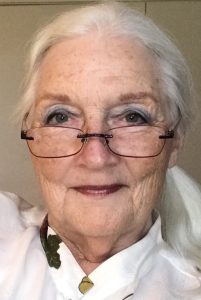Do you remember Pat, the hilariously androgynous character seen on Saturday Night Live in the early 1990s? The humor focused on Pat’s gender ambiguity and the discomfort of others encountering them. The tension never was resolved for the SNL audience, and Pat went on to become a feature-length movie. Have you ever known a Pat?

Linda Cross
It’s easy not to see people who don’t readily identify as typical male or female. Often they don’t want to be seen. We all avoid being seen as odd. We fret over curly hair when we believe long straight hair is more desirable. We hide unsightly birthmarks or moles. We don’t believe bald is beautiful when we lose our hair. We stress over a thousand superficial features about ourselves we wish we could change. And we avoid people whose differences from us make us uncomfortable.
For decades I’ve had gay and lesbian friends. But I didn’t think I’d ever met a trans person and certainly never anyone who self-identified as queer. In fact, the word “queer” was a forbidden word in the world I grew up in. And then about 15 years ago I was invited by a ministry friend, Scott Jones, to join him and a few of his church members for supper after Sunday night church. Over burgers that evening, I heard heartbreaking stories told with laughter and humility by clearly faithful Christians.
“They didn’t look odd to me. They looked like ordinary churchgoers gathered for worship, for fellowship and food.”
They didn’t look odd to me. They looked like ordinary churchgoers gathered for worship, for fellowship and food. Yet their differences had caused them to be rejected by their families, shamed by religious folk, overlooked for job opportunities, ignored in classrooms, abused in school yards, and terribly lonely.
I was convicted. Do you remember that good old evangelistic crusade word “convicted”? My heart burned within me with shame and regret. I was blind, but I was beginning to see.
Conversion programs and much of recent church teaching identify sexual diversity with sin, perversion and promiscuity. But let’s look at these words more closely while listening to Jesus more carefully. Sin is breaking God’s law, and Jesus said loving God with all our heart, mind, strength and soul and our neighbor as our own self fulfills all the law and the prophets.
Is it a sin to be born with both male and female genitalia as some children are? Is it perversion to understand oneself as born into the wrong kind of body as some children realize at a very young age? Are these children in some significant way corrupted before they are able to know any other way? Or are we, like the disciples, asking who sinned, the parents or the child? Jesus tells us we’re asking the wrong questions.
Is it perversion to establish a faithful, committed relationship with someone of the same gender? When we question another person’s suitability for inclusion among Jesus’ followers, we are asking the wrong question.
“When we question another person’s suitability for inclusion among Jesus’ followers, we are asking the wrong question.”
Retired pastor Richard Groves once asked a homeless man he knew what the worst thing about being homeless was. “No matter where I go all day,” he said, “the subway, the stores, the library, it’s just a matter of time before someone tells me I’m not supposed to be there. The worst thing about being homeless is knowing that in the whole world there is nowhere I am supposed to be.”
Is that what we’re doing? Are we “straight” people (what a privileged assumption that is) telling the supposedly not-straight people that they are not supposed to be here? Who are we to make that decision?
“I have other sheep,” Jesus said, “that do not belong to this fold. I must bring them also, and they will listen to my voice. And there will be one flock, one shepherd.”
In context, Jesus was among Jews and they understood this teaching, if they understood it at all, as meaning Gentile sheep. Some who heard him said, “He is demon-possessed and raving mad. Why listen to him?” Yet almost every one of us reading this is from that “other flock.” One of Jesus’ most beloved parables is about the Good Shepherd who puts his own life in danger as he goes in search of one lost sheep and carries it home rejoicing.
Have we been presuming the wrong answers by asking the wrong questions about who can and who cannot be included in Jesus’ flock? Are we actually suggesting that children born with gender or sexual differences are not God’s children and consequently should not be here? Who are we to decide that? Or are we inadvertently suggesting that God has made a profound mistake? Does God not see these children? Does Jesus not search for them?
In another of Jesus’ memorable teaching moments, he told us to remove the log from our own eye before we attempt to remove the speck from our neighbor’s eye. We should consider what our own blind spots are. Are we allowing obscure, hard-to-understand biblical passages to blind us to Jesus’ clear-eyed instructions to love each other as we ourselves have been loved? Are we straining at gnats and swallowing camels of misinformation and prejudice?
Perhaps, like Kris Kristofferson, first we should ask, “Why me, Lord? What have I ever done to deserve even one of the blessings I’ve known?” And then in the words of Clara Scott we should pray, “Open my eyes that I may see glimpses of truth thou hast for me. Open my eyes, illumine me, Spirit divine.”
Linda Francis Cross is a professional writer and communications consultant covering spiritual issues and biblical curriculum. She was an advocate for leadership development for CBF Global Missions and prior to that director of the Baptist Laity Institute of the Baptist General Convention of Texas. She has served as editor on several books and as a co-author for Radical Excellence. She is an ordained Baptist minister and earned her bachelor’s and master’s degrees from Baylor University.
Other articles in this series:
When a teenager gets kicked to the curb by Christian parents


